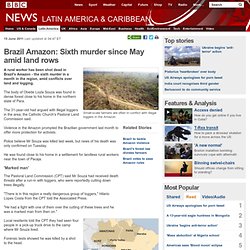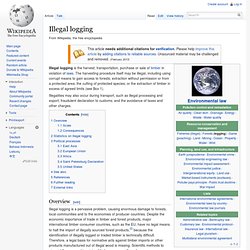

Brazil Amazon: Sixth murder since May amid land rows. 15 June 2011Last updated at 04:47 ET Small-scale farmers are often in conflict with illegal loggers in the Amazon A rural worker has been shot dead in Brazil's Amazon - the sixth murder in a month in the region, amid conflicts over land and logging.

The body of Obede Loyla Souza was found in dense forest close to his home in the northern state of Para. The 31-year-old had argued with illegal loggers in the area, the Catholic Church's Pastoral Land Commission said. Violence in the Amazon prompted the Brazilian government last month to offer more protection for activists. Police believe Mr Souza was killed last week, but news of his death was only confirmed on Tuesday. He was found close to his home in a settlement for landless rural workers near the town of Pacaja. 'Marked man' The Pastoral Land Commission (CPT) said Mr Souza had received death threats after a run-in with loggers, who were reportedly cutting down trees illegally.
Forensic tests showed he was killed by a shot to the head. Iranian nuclear scientist killed in motorbike attack. 29 November 2010Last updated at 13:32 The scientists were targeted in separate attacks on their way to work An Iranian nuclear scientist has been killed and another wounded in two separate but similar attacks in the capital, Tehran.

The scientists were targeted by men on motorbikes who attached bombs to the windows of their cars as they drove to work, officials said. The scientist killed has been named as Majid Shahriari. President Mahmoud Ahmadinejad has accused "Western governments" and Israel of being behind the killing. Another scientist was killed in a bomb blast at the beginning of the year. Dr Shahriari was a member of the nuclear engineering department of Shahid Beheshti University in Tehran. The nuclear scientist injured in the second attack was named as Fereydoon Abbasi. 'Isotope specialist' Dr Abbasi has also been a member of the Revolutionary Guards since the 1979 revolution, the website said.
He said the assassination would not stop Iran from pursuing its nuclear programmes. G1 > Brasil - NOTÍCIAS - Reservas indígenas ocupam 12,5% do território ... As reservas indígenas brasileiras ocupam 12,5% do território nacional, segundo a Fundação Nacional do Índio (Funai).

O número equivale a 1.069.424,34 quilômetros quadrados de terra distribuídos em 503 terras indígenas já reconhecidas. Com exceção do Rio Grande do Norte e do Piauí, todos os outros estados brasileiros possuem áreas de reservas indígenas. O Amazonas é o estado que mais possui áreas indígenas, segundo a Funai. Ainda de acordo com a Funai, a população que vive em aldeias é de 512 mil pessoas, distribuídas em 225 etnias com 180 línguas diferentes.
No Brasil, segundo dados do Instituto Brasileiro de Geografia e Estatística (IBGE), 734 mil pessoas se auto-identificaram como indígenas em 2000. O Brasil ainda tem outras 112 terras indígenas que estão sendo analisadas e ainda não têm superfície definida. Maiores reservas Confrontos A reserva indígena Raposa Serra do Sol, em Roraima, é uma das maiores do país. Leia mais notícias de Brasil. Illegal logging. Illegal logging is the harvest, transportation, purchase or sale of timber in violation of laws.

The harvesting procedure itself may be illegal, including using corrupt means to gain access to forests; extraction without permission or from a protected area; the cutting of protected species; or the extraction of timber in excess of agreed limits (see Box 1). Illegalities may also occur during transport, such as illegal processing and export; fraudulent declaration to customs; and the avoidance of taxes and other charges. Overview[edit] Illegal logging is a pervasive problem, causing enormous damage to forests, local communities and to the economies of producer countries. Despite the economic importance of trade in timber and forest products, major international timber consumer countries, such as the EU, have no legal means to halt the import of illegally sourced forest products,[2] because the identification of illegally logged or traded timber is technically difficult. Scale[edit] America.